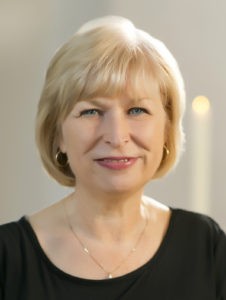Seminary life is profoundly different in 2024 than it was in the late 1980s when I was a seminary student. Looking back, I marvel at the transformation that has taken place in theological education. The rhythms of seminary life, the scheduling and delivery of course content, and the content itself all have shifted dramatically.
The seminary I attended was nestled on a sprawling 30-acre campus that had seven or eight large buildings, hundreds of trees, wide sidewalks and beautiful landscaping. “Place” was important, and my seminary “place” was a beautiful campus, crowded with thousands of students.

Pam Durso
Many of those students lived on or near the campus. We attended mostly daytime classes, four days a week. Our classes were large and featured lecture-based teaching. Professors talked. We students listened and frantically took notes. We typed our research papers on our electric typewriters, handwrote our exams in blue books, and occasionally filled out Scantrons quizzes.
Those of us working toward a master of divinity degree took 90-credit hours’ worth of classes in theology, biblical studies and church history, preparing for a life of service in the church or on the mission field.
My seminary “place” is now in Kansas, sitting in the president’s office at Central Seminary. But unlike my experience, our students do not come to campus. Less than 8% of them live in the Kansas City metropolitan area. Instead, our 450-plus students are scattered across the United States and around the world.
“Less than 8% of our students live in the Kansas City metropolitan area.”
Most all our students attend classes via Zoom, which allows them to more effectively balance their educational commitment, job requirements and family needs. The only students coming into our Shawnee building for class are international students living in the U.S. on student visas and doctoral students participating in their intensive courses.
While our students no longer have physical proximity to one another, they participate in online forums and affinity groups, are invited to monthly peer discussions and cross-program conversations, initiate their own group text messaging with classmates, and attend monthly Zoom chapels with the Central community. In their second or third year, many students are matched with mentors.
Creating community is a core value at Central, because we’ve discovered online learning does not have to be impersonal or detached.
Like other seminaries, Central has expanded its curriculum to address contemporary challenges, including social justice, environmental stewardship and global Christianity. Our classes have a greater emphasis on practical skillsets, the use of technology in ministry settings, and cultural competency, reflecting the changing needs of congregations and society at large.
Our students use laptops, tablets and cloud-based platforms to write and submit their assignments. They have access to a vast digitized collection of resources. Central has shifted almost entirely to use of the Digital Theological Library. All our students, regardless of physical proximity to our main campus, have access to our library plus the 1.5 million books and 61,000 journals available through DTL.
Central has a long history of embracing adaptive change, and in 2024 we as a seminary are once again making a shift. We have sold our 45,000-square-foot and largely unused building located at 6601 Monticello Road in Shawnee, Kan., and will move in late December to a new right-sized space of just under 9,000 square feet located at 8620 W. 110th Street in Overland Park, Kan. This move will allow us to better serve our students and to be better stewards of the resources with which we have been blessed.
Seminary life has changed dramatically in recent years, and Central has faithfully met the challenges of those dramatic changes. Change is always challenging, but we look forward with anticipation to all that is ahead for Central and for the good work God is doing at our school, preparing us for our next season of providing high quality, accessible theological education to our global community of students.
Pam Durso serves as president of Central Baptist Theological Seminary
Related articles:
Central Seminary taps Pam Durso, advocate for Baptist women in ministry, as president
Central Seminary will sell its property and lean in to virtual learning model
The SBC still educates 1 in 5 seminary students | Analysis by Mark Wingfield


